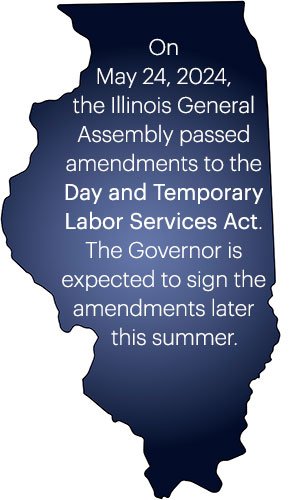Day and Temporary Labor Services Act Update
By Kelly A. Hayden, JD, Chief Legal Counsel
Published June 25, 2024
 On May 24, 2024, the Illinois General Assembly passed amendments to the Day and Temporary Labor Services Act (DTLSA). The Governor is expected to sign the amendments later this summer.
On May 24, 2024, the Illinois General Assembly passed amendments to the Day and Temporary Labor Services Act (DTLSA). The Governor is expected to sign the amendments later this summer.
The DTLSA was originally set to take effect in August of 2023. The General Assembly subsequently delayed the effective date for the Act’s equal pay and benefits provisions until April of 2024. In early March, a court enjoined the Illinois Department of Labor (IDOL) from enforcing the “equivalent benefits” portion of the Act. (Read more in our earlier article.) While this injunction remains in effect, the General Assembly has taken further action to amend this law as follows:
- First, employers do not need to provide comparator pay information to an agency until the worker has worked for the employer at least 720 hours in a 12-month period. (This replaces the previous 90-calendar days period and clarifies questions about the 90-day requirement, confirming that the 90-day or 720-hour threshold is calculated based on time actually worked rather than by calendar days stretching across an assignment.) Further, the agency is responsible for requesting the comparator information, but the employer must supply the necessary information upon request.
- The law also provides guidance to third-party employers with respect to how to determine equivalent pay for agency workers covered by the Act. If there IS a direct comparator to the worker at the employer’s worksite, the pay should be calculated by paying the agency worker “not less than the straight-time hourly rate of pay or hourly equivalent of the lowest paid directly hired comparator employee of the third party client who is entitled to overtime under the Fair Labor Standards Act of 1938, as amended, with the same or substantially similar level of seniority at the company and performing the same or substantially similar work on jobs the performance of which requires substantially similar skill, effort, and responsibility, and that are performed under similar working conditions.”
- If there is NOT a direct hire comparator, the pay shall not be “less than the straight-time hourly rate of pay or hourly equivalent of the lowest paid directly hired employee of the third party client who is entitled to overtime under the Fair Labor Standards Act. ...” Alternatively, the employer, at its discretion, could choose to pay “not less than the median base hourly rate, or hourly equivalent if paid on a salary basis, of workers working in the same or a substantially similar job classification, as reflected in the detail level of the most recent Standard Occupational Classification System published by the United States Department of Labor's Bureau of Labor Statistics (BLS), in the same metropolitan area or non-metropolitan area of Illinois where the work is performed. …” The IDOL is further directed to post the relevant BLS reports as well as links to information on how to determine classification.
- “Equivalent benefits” is now “substantially similar benefits” and states that the agency may comply by paying “the hourly average cash equivalent of the actual cost of the benefits” the employer provides to its employees.
- The agency is relieved of these obligations when the comparators are subject to a collective bargaining agreement.
The amendments also address a number of obligations that the agency will have to the employees it places at third-party sites related to notices, application receipts, and other information.
HR Source members can review the full law here and reach out to the HR Hotline Online or at 800-448-4584 with questions.